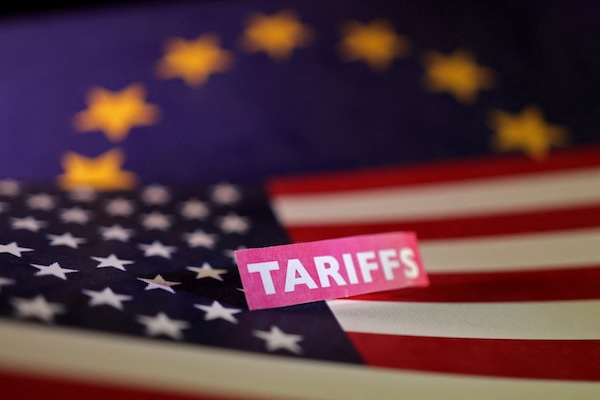 US and European Union flags and a "tariffs" label are seen in this illustration taken 10 April 2025;
Credit: REUTERS/Dado Ruvic
US and European Union flags and a "tariffs" label are seen in this illustration taken 10 April 2025;
Credit: REUTERS/Dado Ruvic
BRUSSELS (Reuters) - On Friday 26 July 2025, it was reported that European Commission President Ursula von der Leyen will meet US President Donald Trump on Sunday 27 July, in Scotland, after European Union (EU) officials and diplomats said they expected to reach a framework trade deal this weekend.
The deal would likely include a 15% baseline tariff on all EU goods entering the United States and probably a 50% tariff on European steel and aluminium, the officials and diplomats said.
"Following a good call with @POTUS, we have agreed to meet in Scotland on Sunday to discuss transatlantic trade relations, and how we can keep them strong," von der Leyen said in a post on X.
Trump on Friday 26 July, said there was a 50-50 chance or perhaps less that the US would reach a trade agreement with the European Union, adding that Brussels wanted to "make a deal very badly".
"We are close to an agreement and it is possible we will reach it during the weekend," one senior EU official said.
Trump will visit his golf courses in Scotland and meet UK Prime Minister Keir Starmer on Monday 28 July.
European luxury and auto shares - two of the sectors most exposed to tariffs along with wine and spirits - rose, with LVMH and Europe's largest car manufacturer Volkswagen closing up around 4% and 3%, respectively, the biggest gainers.
Combining goods, services and investment, the EU and the United States are each other's largest trading partners by far. The American Chamber of Commerce in Brussels warned in March 2025 that any conflict jeopardised $9.5 trillion (€8.1 trillion) of business in the world's most important commercial relationship.
The EU is facing US tariffs on more than 70% of its exports - 50% on steel and aluminium, 25% on cars and car parts and a 10% levy on most other goods, which US President Donald Trump has said he would hike to 30% on Friday 1 August 2025, a level EU officials said would wipe out whole chunks of transatlantic commerce.
Further tariffs on copper and pharmaceuticals are also looming.
The EU has prepared countermeasures that could enter into force on Friday 7 August in the event that talks collapse.
Even if the EU agrees a 15% tariff, avoiding the threat of an even higher one, French car parts supplier OpMobility said it was concerned that the bloc as a whole seemed unable to negotiate better terms than its individual countries. "In the short term, we can probably say that we've avoided the worst, but that does not mean that it's a good deal, at the end of the day it shows that the relationship is unbalanced," CEO Laurent Favre said late on Thursday 24 July. Meanwhile, VW's chief executive Oliver Blume on Friday 25th July, told investors the carmaker hoped investment commitments could help it win further concessions on US tariffs once Washington and the EU had struck a broad trade deal.









